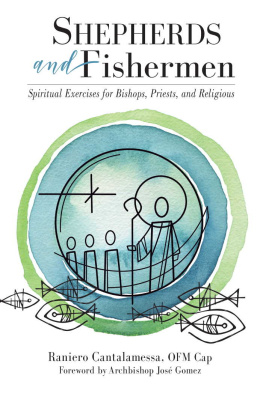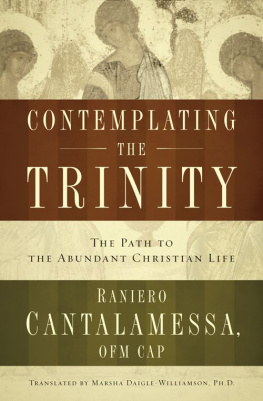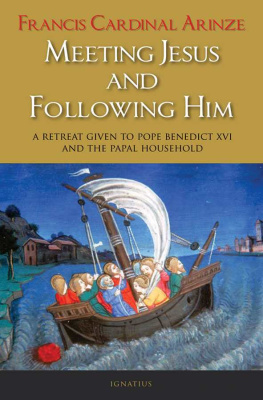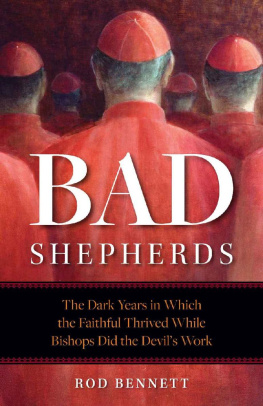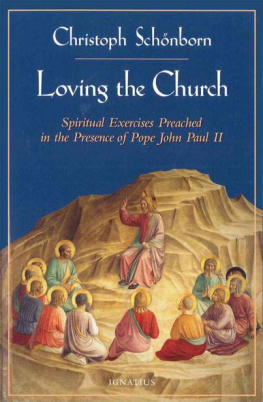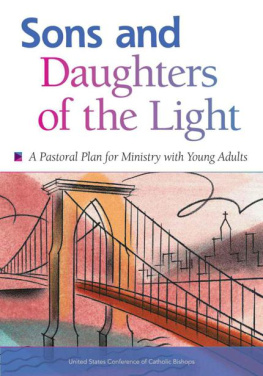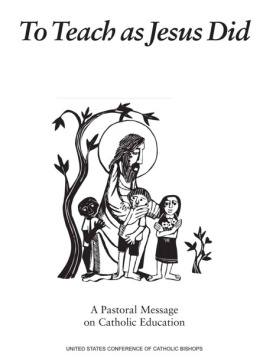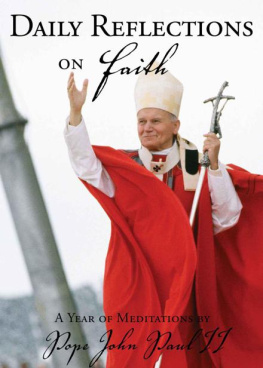He appointed twelve...
that they might be with him
and he might send them forth
to preach. (Mark 3:14)
Foreword
I n January 2019, at the urging of Pope Francis, the American bishops began the year with a weeklong retreat held at Mundelein Seminary in Chicago. For this retreat, the Holy Father generously offered us the services of the longtime preacher of the papal household, Father Raniero Cantalamessa, OFM Cap, who led us in reflecting on our vocation and responsibility as successors of the apostles.
For me, this was a memorable time of deepening conversion and spiritual growth, and it was a blessing to be able to pray and learn from Father Cantalamessa, who is truly one of the spiritual masters of our time. I am grateful to him and Liturgical Press for now bringing out this adaptation of the spiritual exercises that he preached to my brother bishops and I, making his insights and guidance available to the whole church.
At the heart of the meditations offered in these pages is the gospels matter-of-fact account of how our Lord called the first apostles: He appointed twelve... that they might be with him and he might send them forth to preach (Mark 3:14).
In these simple words, we find contained the bishops whole identity and purpose in the mystery of salvation. As Father Cantalamessa explains, like the apostles, the bishop is called to live in intimate communion with Jesus Christ and to share in his noble mission of proclaiming Gods forgiveness and bringing men and women to the encounter with himto see his face, to hear his voice, to know and feel his loving and saving presence in their lives.
To carry out our apostolic vocation, bishops must be committed to renewing this daily encounter of being with Jesus, growing in intimacy through our private prayer and through our listening to his voice as he speaks to us in the gospels. These pages are filled with practical wisdom and pastoral lessons for bishopson lectio divina , preaching, prayer, stewardship, the beauty of celibacy, forming seminarians, and more.
While originally intended for bishops, these reflections will have value for everyone in the churchpriests, deacons, seminarians, consecrated and religious, laymen and laywomen. The life of every Christian, no matter what our station in the world or position in the church, is a call to holiness and mission, a call to walk with Jesus and bear witness to his love in our words and actions. As Father Cantalamessa says, The call to be with Jesus and go forth to preach is not addressed only to pastors but, in a different way, to every baptized person.
A master preacher, Father Cantalamessa draws from the Scriptures, the church fathers, the lives of the saints, and the churchs ancient traditions of prayer and worship. From these sources, he offers us a rich spirituality for missionary discipleshiprooted in the encounter with the living God, who enters into our lives and calls us to follow him and to work with him in fulfilling his plan of redemption.
Reading these meditations today, I am struck by how much things have changed since I first heard this retreat preached in January 2019. The church is living now in the midst of the coronavirus pandemic that has disrupted our economy and institutions, caused immense suffering and sadness, and will no doubt permanently change how we live and minister.
What seems to me most important now, for all of us in the church, is the priority of our relationship with Jesus Christ, as Father Cantalamessa insists upon. Often, as I reread these meditations, I found myself thinking of those stirring words from Evangelii Gaudium , early in Pope Franciss pontificate: I invite all Christians, everywhere, at this very moment, to a renewed personal encounter with Jesus Christ, or at least an openness to letting him encounter them; I ask all of you to do this unfailingly each day. No one should think that this invitation is not meant for him or her.
I pray that these mediations from Father Cantalamessa will lead all of us to that renewal the Holy Father is calling forto a deeper, more personal and intimate, encounter with Jesus Christ, and a new desire to bring the joy of the Gospel to every person.
Most Reverend Jos H. Gomez
Archbishop of Los Angeles
President, United States Conference of Catholic Bishops
July 20, 2020
Memorial of Saint Apollinaris, Bishop and Martyr
Introduction
I n September 2018, Pope Francis and the president of the United States Conference of Catholic Bishops, Cardinal Daniel DiNardo, asked me to lead a week of spiritual exercises for the American bishops. Their intention was that the bishops, free from their pressing daily commitments and in an atmosphere of prayer and personal encounter with the risen Lord, could receive the strength and light of the Holy Spirit necessary to deal with the serious problems the church is facing. The retreat took place at the Mundelein Seminary in Chicago on January 210, 2019, with 250 bishops attending.
Some of those present asked me to publish the texts of the meditations and homilies used for that occasion, believing that those reflections would be able to help other Catholic bishops and priests around the world. I decided to accommodate their request, leaving out what most closely concerned the original audience and preserving what is always valid for everyone in the church.
The central theme of the retreat comes from the brief statement in Marks gospel: He appointed twelve... that they might be with him and he might send them forth to preach (Mark 3:14). During the first part of the retreat, we meditated on what it means today for a bishop or priest to be with Jesus and during the second part on what it means to go forth to preachin other words, personal sanctification and pastoral activity. The title of this book, Shepherds and Fishermen , is meant to highlight the two aspects of pastoral activity: to nourish those who attend church with the word and the sacraments and to reach out to those who are far off or who have distanced themselves from the church. Shepherds of sheep and fishers of men is just what Jesus wanted his apostles to be.
The essential goal for me in a course of spiritual exercises is to facilitate, or help renew, a personal encounter with Jesus in the Holy Spirit. There is not a theme at the center of everything but a person. More than relying on the exercise of our facultiesintelligence, memory, willthe meditations rely on the grace of God received in faith. They have, therefore, a kerygmatic character rather than an ascetic and voluntaristic one. Parenesis is present in every meditation but as a result of the kerygma. The model is the Pauline letters, especially the letter to the Romans.
The exercises, however, should also be a time for a review of ones life and of personal encounter with the Word. With this goal in mind, I have added brief texts for the lectio divina and an examination of conscience, one for each day. In them I let Jesus be the one who speaks in first person to whoever reads it, as the author of The Imitation of Christ so often does. This is not a simple fictional device but a means that helps us become aware of a truth of the faith recalled by the Second Vatican Council: every time we listen to a word from the Gospel, it is the risen One who speaks to us at that moment.
In the daily homilies for the retreat in Chicago, I developed a mystagogical catechesis on the Eucharist that followed the various parts of the Mass: the Liturgy of the Word, consecration, Communion, and adoration. That catechesis is presented in this book as points of reflection for the Eucharistic Hour to which a Marian Hour is added.
The material here may thus be useful for any retreat for bishops, priests, candidates for priesthood, and religious as a kind of manual for spiritual exercises with content that corresponds to the theology and spirituality of the postVatican II church. In it I have tried to put to good use the experience accumulated during my forty years of preaching to the papal household and in retreats to bishops and priests in various countries throughout the world. I also had the privilege of being invited to preach retreats and to share the word of God with Christians of other denominations: Lutherans, Anglicans, Evangelicals, and Pentecostals. I would be pleased if pastors of other churches sharing the same passion for unity also would find something useful for them in the pages of this book.

